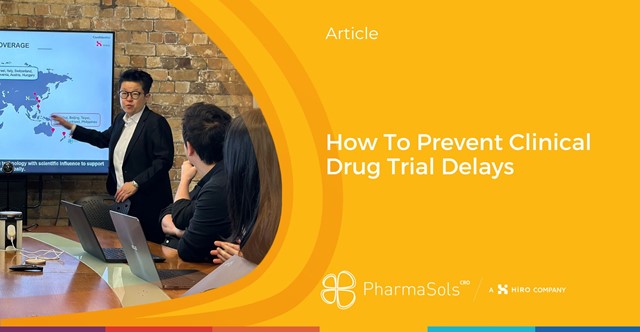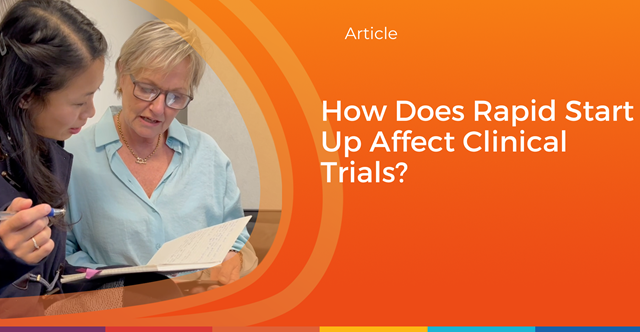12 Sep
The Benefits of Rapid Start Up and How to Achieve It

Time is often always a factor in the development of new therapies, especially for conditions with unmet medical needs or during global health emergencies like we saw with the pandemic.
By focusing on swift applications and submissions, rapid start up ensures that potential treatments reach patients in a timely manner, while avoiding costly disruptions.
However, the ability to achieve rapid start up and maximise its benefits often comes down to who biotechs partner with and where they run their studies.
What Constitutes a Rapid Start up?
Rapid start up refers to the accelerated processes and strategies employed to initiate a clinical trial as quickly as possible without compromising quality and integrity.
This includes expedited regulatory submissions, streamlined ethics processes, and swift site selection and setup.
Benefits of Rapid Start up for Clinical Trials
Accelerating clinical trials through rapid start up enhances not only efficiencies but creates opportunities for strategic advantages:
- Time Efficiency
Achieving rapid start up eliminates many of the traditional bottlenecks encountered during setup for a clinical trial. Instead of waiting for one stage to complete before embarking on the next, many steps progress simultaneously.
By reducing the lead time before trials begin, patients have earlier access to potentially groundbreaking treatments, which can be especially pivotal for conditions lacking current treatments.
- Cost Savings
Efficient processes invariably lead to cost savings.
PhRMA estimated average cost of a successful drug trial to be approximately $2.6 billion, with the cost per day can fall anywhere between $600,000 and $8 million[1]. Trials delayed by even a single day can cost millions.
However, a rapid trial start up can reduce these interruptions, providing a cost-effective solution. Additionally, getting to the market faster allows companies to recover their research and development costs sooner, ensuring a quicker return on investment.
- Competitive edge
The speed of trials can grant a significant edge, with faster trials often translating to first-to-market advantages, especially in high-demand therapeutic areas. Being the first to introduce a product to the market allows for market exclusivity, securing a substantial share before competitors step in, and acts as a reputation booster.
Biotechs that are known for their timely product releases are seen as industry frontrunners, bolstering trust and credibility among their stakeholders. Furthermore, in therapeutic areas with a dire medical need and few available solutions, a swift market entry positions a product as the primary choice, which can drive greater adoption and foster brand loyalty.
Achieving Rapid Start up in Australia and New Zealand
Australia and New Zealand (ANZ) offer a uniquely streamlined pathway for rapid progression through this critical phase, mainly attributed to their advanced and well-structured ethics and regulatory frameworks.
Compared to the US, up to a year can be shaved off the regulatory timeline in ANZ, as there is no requirement for an IND application to conduct clinical trials. Full GMP material is also not mandated for Phase I clinical trials in Australia and New Zealand.
Cancer-fighting organisation BeiGene’s Commercial VP and Head of APAC, Adam Roach, said, “On average in Australia, the first patient into a clinical trial (after approvals) is about three months, whereas, in the US or EU, it’s six to nine months.”[2]
These frameworks are expedient and meticulously designed to ensure that the necessary ethical and quality standards are met.
This supportive environment is not just about speed for the sake of it. It's also about ensuring that the research conducted is of the highest standard, safeguarding both the interests of the organisations and the well-being of the end-users. Any clinical data collected in this region is accepted by other major regulatory bodies, such as the FDA and EMA.
PharmaSols’ Success with Rapid Start up
The key to PharmaSols’ success is our dedicated in-house start-up team and regulatory expert. This team employs highly efficient processes to capitalise on Australia and New Zealand’s ethics and regulatory timeframes, providing sponsors with rapid and cost-effective solutions.
A US biopharmaceutical organisation sought a complex 1b oncology study that required a quick turnaround and PharmaSols was selected as the study’s CRO.
After receiving the protocol, PharmaSols submitted the ethics application to the New Zealand Ethics Committee within a one working day.
Post-review, provisional approval was secured in 14 days. Taking into account the recommendations from the ethics committee, PharmaSols addressed and resubmitted the final application within 9 working days. The committee then granted full approval just 20 working days after submission.
In total, PharmaSols efficiently navigated the ethics approval process in New Zealand, securing approval within 55 days of protocol receipt. Notably, the process was even swifter in Australia, where full approval was achieved in just 35 days from receiving the protocol.
PharmaSols
The emphasis on rapid start up in clinical trials demonstrates a forward-thinking approach to research, where efficiency and quality go hand in hand.
At PharmaSols, we strategically leverage our advantageous ANZ position, using a dedicated team of specialists in rapid start up.
Our rapid start up achievements stands as testament to our success in this approach, underscoring the inevitable evolution of clinical trials — where swiftness in execution does not compromise the gold standard of excellence.
Our proven track record underscores the effectiveness of our approach, emphasising that clinical trials can be both swift and maintain the highest standards of excellence.
Speak to our rapid start up specialists to accelerate your upcoming study.
[1] Accelerating Study Start-Up: The Key to Avoiding Trial Delays (Online) Available at: https://acrpnet.org/2017/02/01/accelerating-study-start-up-the-key-to-avoiding-trial-delays/
[2] https://www.smh.com.au/business/entrepreneurship/invest-bravely-cancer-fighting-giant-sets-sights-on-australia-20220429-p5ah8j.html
Other News
March 2024 (1)
February 2024 (1)
December 2023 (1)
November 2023 (1)
October 2023 (1)
September 2023 (2)
August 2023 (1)
July 2023 (1)
June 2023 (2)
May 2023 (3)
April 2023 (1)
March 2023 (2)
The Go-to region for clinical trials (1)
HiRO – our global advantage, tailored solutions and key partnerships (1) (1)
HiRO – an emerging full-service global CRO (1)
HiRO – Top CRO in APAC 2022 (1) (1)
November 2022 (1)
October 2022 (1)
September 2022 (1)
August 2022 (1)
July 2022 (1)
June 2022 (1)
May 2022 (1)
April 2022 (1)
March 2022 (1)
January 2022 (1)
December 2021 (1)
November 2021 (1)
October 2021 (2)
September 2021 (2)
August 2021 (3)
July 2021 (3)
June 2021 (2)
May 2021 (1)
April 2021 (2)
March 2021 (1)
February 2021 (1)
December 2020 (5)
November 2020 (1)
October 2020 (5)
September 2020 (1)
August 2020 (2)
May 2020 (5)
January 2024 (0)



